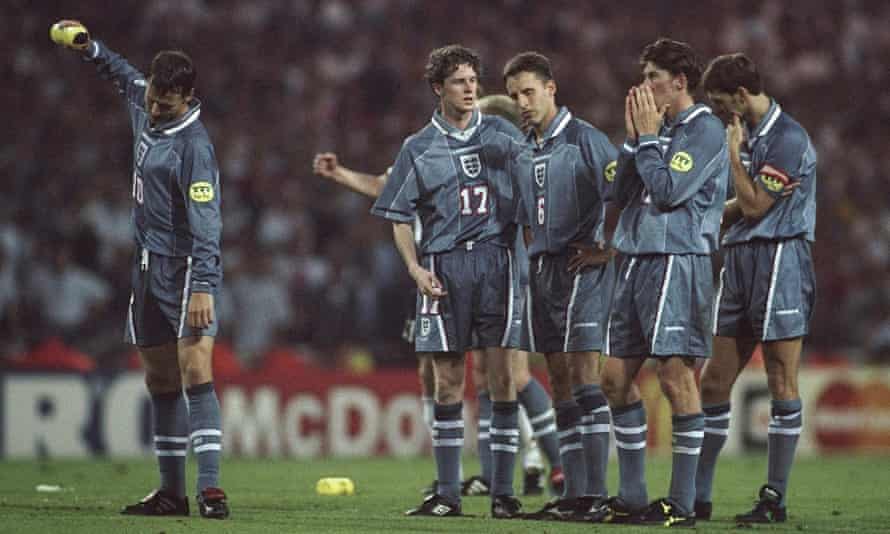It is probably the greatest goal celebration that never happened. “It was one of those things when you are messing about and had kind of been mentioned in passing,” says Darren Anderton. “We all knew the new format of golden goal and we all thought: ‘Wouldn’t it be hilarious just to run off the pitch?’”
Eighty seconds of extra time in the Euro 96 semi-final between England and Germany had elapsed when the Tottenham midfielder’s big moment arrived. Reaching Steve McManaman’s pass just before Andreas Köpke, Anderton watched in despair as the ball cannoned off the inside of a post and somehow ended in the goalkeeper’s arms.
“It would have been a very long run back to the changing room but it would have been worth it,” says the 49-year-old, who lives in California.
“Scoring would have been the perfect ending to an amazing performance. I feel like we were the better team and it’s the same now. We have the better players and we should win if we play well.”
Unfortunately for Anderton, that devastating shootout defeat at Wembley was the only time he faced England’s regular tournament nemeses after injury scuppered his hopes of making the Euro 2000 squad. But Terry Butcher, captain of Bobby Robson’s side that lost to West Germany in the last four at Italia 90 in his final England appearance, came up against several formidable German teams during his 10-year international career.
“I’ve had a good few scraps against them,” he says. “Teams at international level changed a lot over the decades I played so I remember having to mark Karl-Heinz Rummenigge at the 1982 World Cup and then Rudi Völler and Jürgen Klinsmann in 1990.
“Germany have always been like a machine – their system grinds out results and players on a conveyor belt of finals in major championships.”
The former Ipswich and Rangers defender managed one victory against West Germany in four attempts: a 3-0 win in Mexico a year before the 1986 World Cup.
“Bobby took us out there to acclimatise and we had been there for about 10 days before the game,” says Butcher. “They flew in a day or two before as an experiment and you could see it didn’t work out for them because they tired quickly and were never at the pace of the game. But it did tick a box for them because the next year they were in the final so it obviously helped.”
Anderton had not seen the Euro 96 semi-final until last summer during lockdown and even then could not bring himself to watch the penalty shootout.
“It was just too much,” he says. “Seeing my chance hit the post and then spin back to the goalkeeper – oh my God, how was his luck?! Sometimes I do imagine what would have happened if it had gone in but unfortunately it wasn’t meant to be.”
He was a teenager about to break into Portsmouth’s first team when England lost at the same stage in the World Cup six years earlier.

“I remember watching Italia 90 and the emotions that brought. So to then be a part of a game of the same magnitude was very intense,” Anderton says. “The Germans always play the right way – they want to try to win the game rather than just shutting up shop.
“Walking around that pitch after we had lost, it just did not feel right that we weren’t going to be coming back. I didn’t want to go on holiday.”
Butcher says the consoling words of the West Germany coach, Franz Beckenbauer, after the 1990 shootout defeat “blew us away a bit”.
“The Germans were fine and we didn’t have a problem with them,” he says. “I remember after the game we got on the coach and there were hundreds of people everywhere outside.
“We started having a few beers while we were waiting to leave and we could see the Germany coach next to us about 20 yards away with all the players on. They were all sitting there with bottles of water and started looking across at us. By that time we were singing a few songs and you would never have guessed that we had just lost the game. They were actually quite funny because they raised their bottles of water to us and we raised our beers back.”
But the abiding memory of England v Germany games is not that night in Turin for the man who won 77 caps. His dog, Fritz, will be banished from the living room for Tuesday’s instalment because of Butcher’s tendency “to get carried away and start shouting” when he watches England, even if the 12-year-old schnauzer has a special place in his heart.
“We got him the day after Bobby made what turned out to be his last public appearance at the 1990 charity rematch at St James’ Park,” he says.
“You couldn’t have scripted it better: England played Germany, we won the game and it was Bobby’s last match. All he could say was: ‘Where’s Gazza?’ It was a really emotional time and a great occasion – everyone was virtually saying goodbye to him. It was a real tearjerker. But whenever we look at Fritz we are always reminded of that occasion.”
from Football | The Guardian https://ift.tt/3xWF4OH
via IFTTT

No Comment